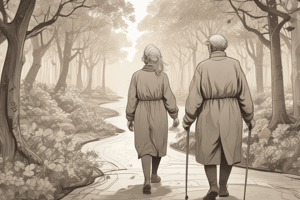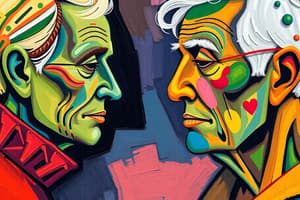Podcast
Questions and Answers
Which intervention is specifically aimed at enhancing the emotional connection and communication for older adults?
Which intervention is specifically aimed at enhancing the emotional connection and communication for older adults?
- Reality orientation
- Nutrition education
- Body image interventions
- Touch (correct)
What is the primary focus of reality orientation as an intervention for older adults?
What is the primary focus of reality orientation as an intervention for older adults?
- Reinforcing accurate understanding of time and place (correct)
- Addressing nutritional needs
- Enhancing social interactions
- Improving physical health
Which psychosocial health intervention is intended to provide emotional reassurance and connectedness to older adults?
Which psychosocial health intervention is intended to provide emotional reassurance and connectedness to older adults?
- Meal planning
- Therapeutic communication (correct)
- Physical therapy
- Medication management
Which of the following interventions focuses on improving the perception older adults have of their own appearance?
Which of the following interventions focuses on improving the perception older adults have of their own appearance?
What is a crucial element when designing interventions for older adults undergoing psychosocial health challenges?
What is a crucial element when designing interventions for older adults undergoing psychosocial health challenges?
What primarily influences the adoption of technology in the social age?
What primarily influences the adoption of technology in the social age?
What aspect of cognitive change is primarily observed in older adults?
What aspect of cognitive change is primarily observed in older adults?
At what age do major changes in intellectual functioning typically occur?
At what age do major changes in intellectual functioning typically occur?
What component of self can be defined as 'what we think we ought to be'?
What component of self can be defined as 'what we think we ought to be'?
How does personality typically change in healthy individuals as they age?
How does personality typically change in healthy individuals as they age?
What slows down as individuals age, impacting their task performance?
What slows down as individuals age, impacting their task performance?
Based on adult development theories, who proposed the concept of life span development?
Based on adult development theories, who proposed the concept of life span development?
What does self-esteem reflect in an individual's self-concept?
What does self-esteem reflect in an individual's self-concept?
What is an example of a psychosocial health intervention for elderly individuals?
What is an example of a psychosocial health intervention for elderly individuals?
What is a primary concern addressed by psychosocial health interventions?
What is a primary concern addressed by psychosocial health interventions?
Which factor is least likely to affect psychosocial adaptation in elderly individuals?
Which factor is least likely to affect psychosocial adaptation in elderly individuals?
Which of the following best describes a supportive buffer that aids elderly individuals during role transitions?
Which of the following best describes a supportive buffer that aids elderly individuals during role transitions?
When addressing psychosocial health concerns, which intervention would be most effective for combating loneliness?
When addressing psychosocial health concerns, which intervention would be most effective for combating loneliness?
Which issue is commonly faced by elderly individuals during significant role changes such as retirement?
Which issue is commonly faced by elderly individuals during significant role changes such as retirement?
What psychosocial characteristic may influence how well elderly individuals adapt to aging?
What psychosocial characteristic may influence how well elderly individuals adapt to aging?
In the context of psychosocial health, which intervention focuses on restoring a sense of purpose for elderly individuals?
In the context of psychosocial health, which intervention focuses on restoring a sense of purpose for elderly individuals?
Flashcards
Common Losses of Aging
Common Losses of Aging
Aspects of life negatively impacted during aging, including health, significant relationships, feelings of usefulness, social interactions, income, independence, and physical changes associated with aging.
Physiological Changes (Aging)
Physiological Changes (Aging)
Processes of aging that impact virtually every body system. These changes can affect major functionalities.
Cognitive Changes (Aging)
Cognitive Changes (Aging)
Intellectual abilities that can decline through different stages of aging, leading to conditions like delirium (acute confusion), dementia (generalized impairment), and depression.
Psychosocial Changes (Aging)
Psychosocial Changes (Aging)
Signup and view all the flashcards
Aging Health Concerns
Aging Health Concerns
Signup and view all the flashcards
Chronological Age
Chronological Age
Signup and view all the flashcards
Biological Age
Biological Age
Signup and view all the flashcards
Psychological Age
Psychological Age
Signup and view all the flashcards
Social Age
Social Age
Signup and view all the flashcards
Psychological Aspects of Aging
Psychological Aspects of Aging
Signup and view all the flashcards
Personal Adaptation (to aging)
Personal Adaptation (to aging)
Signup and view all the flashcards
Social Roles (of the elderly)
Social Roles (of the elderly)
Signup and view all the flashcards
Cognitive changes in Aging
Cognitive changes in Aging
Signup and view all the flashcards
Social Age
Social Age
Signup and view all the flashcards
Psychological Aspects of Aging
Psychological Aspects of Aging
Signup and view all the flashcards
Normal Cognitive Changes (aging)
Normal Cognitive Changes (aging)
Signup and view all the flashcards
Crystallized Memory
Crystallized Memory
Signup and view all the flashcards
Personality Development
Personality Development
Signup and view all the flashcards
Self-Concept (Self)
Self-Concept (Self)
Signup and view all the flashcards
Personality (aging)
Personality (aging)
Signup and view all the flashcards
Self-Esteem (Self)
Self-Esteem (Self)
Signup and view all the flashcards
Study Notes
Old Age Psychological and Social Changes
- Learning Objectives: Define chronological, biological, psychological, and social age. Discuss psychological aspects of aging. Discuss personality dimensions affected by aging. Discuss personal adaptation. Identify compensation and substitution processes. Identify consolidation processes. Discuss cognitive changes of aging. Relate culture to psychological and social adaptation. Recognize social roles of elderly. Discuss buffers for role transitions.
- Learning Objectives (cont.): Explain major issues of adaptation to significant role changes like retirement or widowhood. Discuss developmental tasks, losses, physiological, cognitive, and psychosocial changes experienced by the elderly. Discuss psychosocial health concerns. Identify interventions related to psychosocial health concerns. Explain acute care and restorative care concerns.
- Development throughout life: Behavior is influenced by hereditary, cultural factors, and individual choices.
Chronological Age
- Chronological age is defined as the number of years a person has lived, used as a standard in psychometrics to measure behavior and intelligence.
Biological Age
- Biological age refers to the age a typical person would be with a similar body and mind. It's compared to chronological age—the number of years lived.
Psychological Age
- Psychological age refers to how a person ages, which may or may not match their actual age and is represented by non-physical maturity.
- For example, a younger business owner with a psychological age older than their actual age might want to sell their business because they feel it has reached its peak. In contrast, a younger business owner with a smaller gap between their psychological and chronological age may believe their business is still growing.
Social Age
- Social age encompasses changes from the information age. It prioritizes social factors when adopting or extending technology and information.
- Social age broadens the definition as it concentrates on different societal interactions, including collaboration and sharing.
Processes in Development
- Development involves biological, cognitive, and socio-emotional processes.
Psychological Aspects of Aging
- Psychological Development: This section discusses aspects of psychological development.
- Normal Cognitive Changes: Lifetime abilities usually remain intact. However, changes mostly occur in abilities that are less central to the person's daily skills. Crystallized memory supports intellectual functions. Significant changes in intellectual function typically occur only in older adulthood, usually after age 60.
- Normal Cognitive Changes (cont.): The major impact of aging on cognitive processes is a slowing down. This slowing is related to changes in the CNS and the sensory system. Older adults often need more time for physical and mental tasks.
- Adult Development Theories: Theories related to adult development.
- Personality and Self: Personality continues to develop throughout life and follows a pattern of continuity in healthy individuals. There's no significant change in personality development that occurs with aging in healthy individuals.
- Self (the me and I): Components include self-concept, ideal self, self-evaluation, and self-esteem.
- Personality and Self (cont.): At midlife, people have gained significant self-knowledge. Consequently, people adapt by avoiding roles inappropriate to them as they age. As time progresses, there's clearer self-understanding and acceptance, which is common among older adults.
- Atchley 1994: This study highlighted that older adults often feel they know themselves better than anyone else.
Personal Adaptation
- Adaptation is adjusting to situations or environments to serve the purpose of life satisfaction.
- Adaptation addresses aspects like maintenance, renewal, completion, reinforcement of self, and survival.
- Specific Adaptations in Aging: This includes adapting to less income, increasing dependency, lost roles/activities, and maintaining self-esteem.
Other Aspects of Adaptation
- Continuity: Internal ideas and memory, and environmental reinforcement and social role demands influence an individual's ability to adapt.
Compensation
- Compensation is a process of taking actions to offset losses.
- Losses can be social, physical, emotional, or financial losses.
Substitution
- Substitution involves replacing lost roles, experiences, activities, and more.
- Substitution can be valuable for the elderly, but some substitutions might not be favorable.
Consolidation
- Consolidation is about reallocating time, energy, financial resources, and emotional commitments to remaining roles.
Managing Threats to Self-Identity and Self-Esteem
- Defense mechanisms like selective perception, selective memory, and selective interaction help manage threats to self-esteem. These mechanisms support positive self-perception.
Other Aspects of Adaptation (cont.)
- Competency and Capability: Mental and physical competency and capability are important aspects of adapting to life changes.
- Relative Appreciation: Comparing oneself to others or groups provides a sense of self. Understanding and appreciating those who are similar to yourself provides a valuable coping strategy for adapting to life's changes.
Developmental Tasks for Elderly People
- The tasks elderly individuals face are associated with varying degrees of change and loss. Examples of common losses include health, significant others, sense of usefulness, socialization, income, and independent living.
Physiological Changes
- Body systems undergo changes as people age.
- Cognitive changes include conditions like delirium, dementia (with Alzheimer's being a common form), and depression, which can affect 20% of older adults.
Psychosocial Changes
- Psychosocial changes in aging include changes in roles, relationships (such as retirement), social isolation, sexuality, housing, and environmental changes.
Health Concerns
- Psychosocial health concerns include social isolation, cognitive impairment, and stress related to life changes.
Interventions
- Interventions addressing psychosocial health concerns: These focus on therapeutic communication, touch, reality orientation, and body image interventions.
- Acute Care Concerns: This includes comfort, safety, nutrition, hydration, skin integrity, and complications like delirium, dehydration, malnutrition, nosocomial infections, urinary incontinence, and falls.
- Restorative Care Concerns: This involves convalescence from acute care.
Special Concerns
- Interventions should support and advance acute care, focusing on individual holistic needs and chronic conditions, along with promoting health and personal independence.
Studying That Suits You
Use AI to generate personalized quizzes and flashcards to suit your learning preferences.




